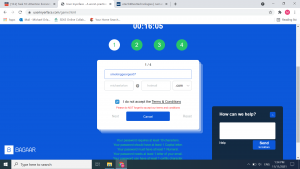Well I tried, but I could not get passed the first set of questions. As you can see, I attempted the task for approximately 16 minutes. Still not sure why I was unsuccessful.

I tried various words that should have met all the requirements. I hope I am not missing something obvious. The wording for password requirements was unusual. For example, the password “should” have at least one capital letter, and “must” have at least one numeral. I tried various combinations with no luck.
The “hurry up, time is ticking!” and “how can we help” boxes kept popping up and drawing my attention away from the task. When I clicked on “terms and conditions” I had to scroll down very slowly to get to the bottom where I could “accept.” When I attempted to close the “hurry up, time is ticking!” box the icon of my mouse would not change when it was hovering over “close”. Little changes such as these were frustrating me.
All the distractions mentioned above reduced my time spent trying create a working password. This was my only objective, and my effort and attention was taken away from me. Out of all the messages that were conveyed this week in our course, Tristan’s Harris’s comments about the potential for data collection to help solve people’s problems really stood out to me. He used the example of data collection being used to host a dinner with friends. As a teacher, I have never seen more mental health issues with my students then I do right now. Perhaps they were always there, but I am definitely witnessing the affects in the classroom more then I ever have in my short teaching career. If the data collecting would be used to benefit the individual, I think I would see a different side to my students.